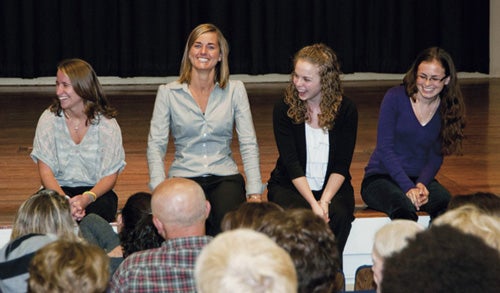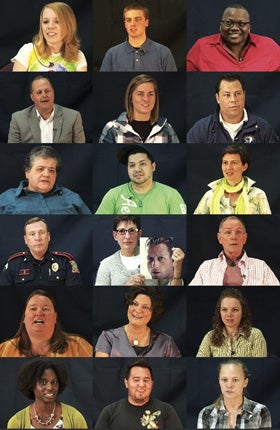Coming Out for Change

“I’ve advised student organizations for many years, and I’ve seen students do some amazing things,” said Human Development and Family Studies Professor Annemarie Vaccaro. “But this is the biggest thing I’ve ever seen students do.”
She is talking about It Gets Better at URI: Coming Out for Change*, a student-made film that represents both a minor miracle and a University-wide commitment to support students struggling with their sexual identity. The miracle is the story behind how the film was made; the effect of the film on campus and beyond has already been felt.
 Late in the spring 2011 semester, five members of the LBTQ Women’s Group, which meets weekly on campus, decided to make a small film as URI’s contribution to the national effort known as “It Gets Better.” The movement, which offers support for young people, was started after some highly publicized suicides that resulted from harrassment and bullying of gay students. The five—graduate students Jen Kaye and Kim McGuiness, sophomore Portia Burnette, senior Christina Kinney, and junior Dana Speesler—had no experience in filmmaking, and they were thinking, “we could maybe use our cell phones to shoot some video and post it online.”
Late in the spring 2011 semester, five members of the LBTQ Women’s Group, which meets weekly on campus, decided to make a small film as URI’s contribution to the national effort known as “It Gets Better.” The movement, which offers support for young people, was started after some highly publicized suicides that resulted from harrassment and bullying of gay students. The five—graduate students Jen Kaye and Kim McGuiness, sophomore Portia Burnette, senior Christina Kinney, and junior Dana Speesler—had no experience in filmmaking, and they were thinking, “we could maybe use our cell phones to shoot some video and post it online.”
Problem number one: It was final exam week. Most students would vacate campus in a matter of days, and many faculty would be less available. With help from Vaccaro, clinical counselor Holly Nichols, and Carolyn Sovet, a student life staff member, the five students sent emails and delivered flyers to academic departments. Within days they had heard from over 80 people who wanted to be interviewed, and they received money from faculty, staff, administrators, and some academic programs to underwrite the film.
“What it showed us,” Nichols said, “is that this campus is filled with supportive people who understand the struggles that gay students face, and they want to help in whatever way they can.”
When the students began working with filmmaker Robert Rose last summer, they had commitments for interviews from more than two dozen students and 60 faculty, staff, and administrators—far more than they ever anticipated. They worked with Rose all summer recording interviews and editing, ending up with almost 30 hours of film that they had to distill down to about one hour. The result is a candid, sometimes surprising, sometimes inspirational, and often emotional record of testimony from students, faculty members, and URI staff, several of whom came out publicly about their homosexuality for the first time.
Leslie Williams, director of student conduct and community affairs, gave perhaps the most emotional interview as she talked about her mother, who, when Williams was in high school, had encouraged her to accept the fact that she was gay. Years later her mother committed suicide. “I appreciate the students making the effort that they did,” Williams said. “I wanted to get the message to students about the finality of suicide and to assure others on campus—students and staff—that they are not alone and they can find support.”
President David Dooley, Provost Donald DeHayes, vice presidents, deans of various colleges, and Athletic Director Thorr Bjorn all made cameos of support in the film. Since the October 5 premier in Edwards Auditorium, the group has sold 100 copies, Dooley has ordered 30 for various offices, and many student organizations and academic departments have asked for a screening. The film is scheduled to air on public television in Rhode Island this winter, and Rhode Island College has requested a screening.
Assistant Athletic Director Gina Sperry was key to the Athletic Department’s remarkable involvement with the film. More than half the audience at the premier was composed of athletes who were required to attend. Athletics Director Bjorn was the first University official to respond to the students’ call for support; in the film he talked about how his views changed when his sister revealed that she is a lesbian.
His support for the project helped inspire Sperry to make her own revelation. “The athletics staff community is a small group across the country,” Sperry said. “There is always fear that you could lose your job or not find another. Homophobia is deeply embedded in the athletic community, so it was scary for me to come out. I’ve really been heartened by the response. Some folks have said that if they had known I was gay, they would have come out to their teams long ago.
“Afterwards student-athletes and coaches thanked me. I was very nervous watching the film with them, but I felt great about it when they said later, ‘it takes a lot of courage.’ The most important thing, though, is that this will show students that there are people here who will support them and help them when they are struggling.”
That is the film’s main objective. “When I was in high school, I wish I had had something like this,” said Kinney, a marine affairs major, who first brought the film idea to her friends in the women’s group.
“We started this as an effort to support people,” McGuiness added, “then it turned into forming allies and giving them a chance to help.”
Burnette noted that many of the film’s participants wanted to counter last year’s negative publicity about the University: “People felt they were being labeled as non-supportive, and they saw that they needed to be public with their support.”
Dean Lynn McKinney of the College of Human Science and Services wanted to participate because, he said, suicides have continued to occur among gay students nationwide: “I wanted to do something to help. The atmosphere here on campus is much better than it used to be. Kathryn Friedman, the University’s interim vice president for diversity, has brought a new level of comfort for gay faculty, staff, and students.”
The vanguard of five students all said they had no idea the project would become as big or as significant as it has. “We never expected the kind of response we got,” Kaye said, echoing Speesler’s sentiment that the project became much bigger than they anticipated. “It surprised me that there were professors who were willing to be allies,” she said. “It has been an amazing learning experience.”
By John Pantalone ’71
*The video will be aired this spring on RI PBS.
 Home
Home Browse
Browse Close
Close Events
Events Maps
Maps Email
Email Brightspace
Brightspace eCampus
eCampus


